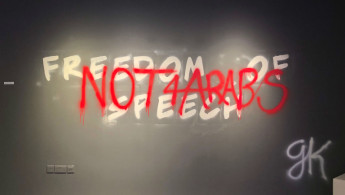Qatar blockade arms artists with new palette
In a region more known for discouraging political participation among its residents, artists, musicians, and creatives in the Gulf regions are rarely given the opportunity to decorate their city's walls. Those who dare deface the region's pristine, shiny buildings face severe punishment.
But artists in Qatar have this year been exposed to the creative freedom to express themselves - and, they say, it's all thanks to the blockade, in which Saudi Arabia, along with Bahrain, the United Arab Emirates and Egypt, severed diplomatic ties with Qatar, accusing it of supporting terrorism and fostering close ties with their regional rival Iran. Doha has denied all charges and has accused the quartet in return of attempting to force regime change.
"Before the blockade there was barely any art visibly seen out in public. There was an art scene but it was very shy and reserved, but since the blockade it has become a lot more vibrant and it highlights a range of issues in society as a whole. Through art, we are trying to change the outdated habits of our society," artist Ammar Alqamash said.
Buildings along Qatar's shiny skyline now proudly host an iconic image of Emir Tamim bin Hamad - artwork designed spontaneously by Qatari artist Ahmed bin Majed.
The image, which has become the symbol of Qatar's resistance to regional pressure, has been reproduced across the nation, on the side of residential buildings along with the nation's flag, on the back of people's phones and at intersections of the capital's busiest junctions.
Nationalistic graffiti showcasing the ruling family and slogans of freedom and dignity occupy most previously bland spaces. Artists in Qatar, have quite literally, painted the town red… and white.
But more than a year and a half after the blockade began, artists maintain the tiny Gulf state has progressed beyond nationalism and resistance, noting they have, for the first time, began using their canvases to reflect cultural and societal issues.
 |
The blockade was like a wake up call for the creatives of Doha. It reminded them that we don't live in a perfect society and that we have problems we need to deal with |  |
"The blockade was like a wake up call for the creatives of Doha," said filmmaker Eiman Mirghani. "It reminded them that we don't live in a perfect society and that we have problems we need to deal with. We should be open enough to talk about them in order to heal and move forward."
Thousands flocked to Qatar's annual Ajyal Film Festival in Doha this year to witness this somewhat radical change.
More than 81 films from 36 countries, including 24 films from the Arab world and 44 by women filmmakers, as well as artwork by Qatar's young and active talents were given the red carpet treatment, which also hosted Hollywood A-listers and Qatar's own royalty.
| Instagram Post |
Bold films produced and directed by Qatari filmmakers were showcased in one of the country's most prominent cinema screens. Mahdi Ali Ali's Amphitheater, Amal al-Muftah's best film winner, Sh'hab and Nouf al-Sulaiti's Gubgub daringly tackled feminism in a conservative society - giving lead roles to women and girls with ambitions to break society's patriarchal traditions.
Mirghani's film The Bleaching Syndrome meanwhile spoke of racism and colourism in a society that still quite blatantly suffers from a superiority complex.
"There has been a revolution of artists here, especially women, who are creating great paintings, films and writings, while openly discussing their roles as women in this society for the first time ever," said Mirghani, the Sudanese filmmaker and resident of Qatar.
But more poignantly, artists taking part in the Re[A]ction exhibition took aim at current affairs, including the killing of Saudi journalist Jamal Khashoggi who was murdered in Riyadh's Istanbul consulate on October 2.
Qatari artist Ghada bint Ali highlighted suppression of political dissent in the Arab world with her graffiti piece Freedom of Speech is Not for Arabs.
The phenomena of social media trolling and online bullying was also given a space for debate, as was Religion Traders - a piece quite daringly taking aim at state-sponsored religious figures spewing propaganda for financial gain.
"The blockade has also opened a platform for the non-Qatari, creative residents to share their stories and create a more culturally inclusive environment for all to live and speak up for themselves," Mirghani said, acknowledging that more work was needed to create inclusivity for non-Qatari residents.
The exhibitions have been patronised by the visits of senior royal family members, including Sheikha Moza bint Nasser, which suggests that the leadership itself is not only allowing such discussions, but encouraging and listening to the issues highlighted by young active residents.
But despite the waves of change, Qatar's conservative society requires time to deliver real progress and offer authentic freedom of expression to its young population.
Despite hosting the globally recognised Al Jazeera television network, Qatar ranks 128th on the World Press Freedom Index. Reporters Without Borders describes the state as having "a draconian system of censorship".
But Qatar's artists commend the stepping stones being laid in the embattled state, which has undoubtedly begun to reveal more of itself, even if slightly, through artistic expression.
"And that's the great beauty of Qatar's creative scene today," said Mirghani. "Many artists are taking the initiative to speak about their personal experiences - a radical change when you consider how conservative and private the society is here. But through this change, people's stories become humanised and relatable. And as a result, the blockade has given us more provocative, honest and communal artworks."
Follow Sana Uqba on Twitter: @Sanasiino



